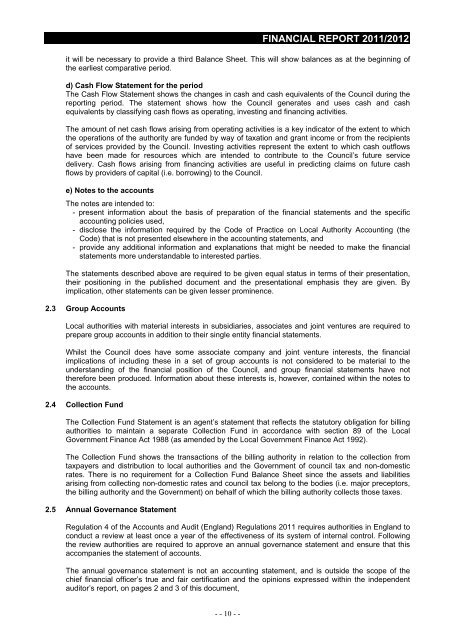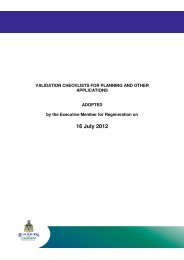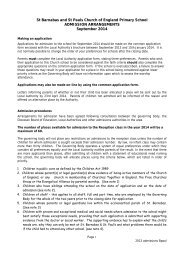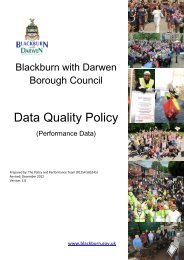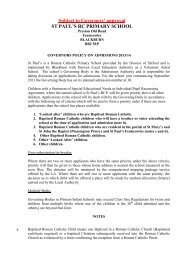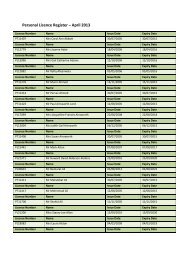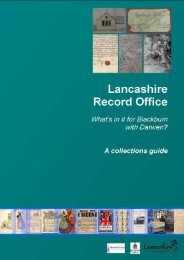Statement of Accounts 2011/2012 - Blackburn with Darwen Borough ...
Statement of Accounts 2011/2012 - Blackburn with Darwen Borough ...
Statement of Accounts 2011/2012 - Blackburn with Darwen Borough ...
You also want an ePaper? Increase the reach of your titles
YUMPU automatically turns print PDFs into web optimized ePapers that Google loves.
FINANCIAL REPORT <strong>2011</strong>/<strong>2012</strong><br />
it will be necessary to provide a third Balance Sheet. This will show balances as at the beginning <strong>of</strong><br />
the earliest comparative period.<br />
d) Cash Flow <strong>Statement</strong> for the period<br />
The Cash Flow <strong>Statement</strong> shows the changes in cash and cash equivalents <strong>of</strong> the Council during the<br />
reporting period. The statement shows how the Council generates and uses cash and cash<br />
equivalents by classifying cash flows as operating, investing and financing activities.<br />
The amount <strong>of</strong> net cash flows arising from operating activities is a key indicator <strong>of</strong> the extent to which<br />
the operations <strong>of</strong> the authority are funded by way <strong>of</strong> taxation and grant income or from the recipients<br />
<strong>of</strong> services provided by the Council. Investing activities represent the extent to which cash outflows<br />
have been made for resources which are intended to contribute to the Council’s future service<br />
delivery. Cash flows arising from financing activities are useful in predicting claims on future cash<br />
flows by providers <strong>of</strong> capital (i.e. borrowing) to the Council.<br />
e) Notes to the accounts<br />
The notes are intended to:<br />
- present information about the basis <strong>of</strong> preparation <strong>of</strong> the financial statements and the specific<br />
accounting policies used,<br />
- disclose the information required by the Code <strong>of</strong> Practice on Local Authority Accounting (the<br />
Code) that is not presented elsewhere in the accounting statements, and<br />
- provide any additional information and explanations that might be needed to make the financial<br />
statements more understandable to interested parties.<br />
The statements described above are required to be given equal status in terms <strong>of</strong> their presentation,<br />
their positioning in the published document and the presentational emphasis they are given. By<br />
implication, other statements can be given lesser prominence.<br />
2.3 Group <strong>Accounts</strong><br />
Local authorities <strong>with</strong> material interests in subsidiaries, associates and joint ventures are required to<br />
prepare group accounts in addition to their single entity financial statements.<br />
Whilst the Council does have some associate company and joint venture interests, the financial<br />
implications <strong>of</strong> including these in a set <strong>of</strong> group accounts is not considered to be material to the<br />
understanding <strong>of</strong> the financial position <strong>of</strong> the Council, and group financial statements have not<br />
therefore been produced. Information about these interests is, however, contained <strong>with</strong>in the notes to<br />
the accounts.<br />
2.4 Collection Fund<br />
The Collection Fund <strong>Statement</strong> is an agent’s statement that reflects the statutory obligation for billing<br />
authorities to maintain a separate Collection Fund in accordance <strong>with</strong> section 89 <strong>of</strong> the Local<br />
Government Finance Act 1988 (as amended by the Local Government Finance Act 1992).<br />
The Collection Fund shows the transactions <strong>of</strong> the billing authority in relation to the collection from<br />
taxpayers and distribution to local authorities and the Government <strong>of</strong> council tax and non-domestic<br />
rates. There is no requirement for a Collection Fund Balance Sheet since the assets and liabilities<br />
arising from collecting non-domestic rates and council tax belong to the bodies (i.e. major preceptors,<br />
the billing authority and the Government) on behalf <strong>of</strong> which the billing authority collects those taxes.<br />
2.5 Annual Governance <strong>Statement</strong><br />
Regulation 4 <strong>of</strong> the <strong>Accounts</strong> and Audit (England) Regulations <strong>2011</strong> requires authorities in England to<br />
conduct a review at least once a year <strong>of</strong> the effectiveness <strong>of</strong> its system <strong>of</strong> internal control. Following<br />
the review authorities are required to approve an annual governance statement and ensure that this<br />
accompanies the statement <strong>of</strong> accounts.<br />
The annual governance statement is not an accounting statement, and is outside the scope <strong>of</strong> the<br />
chief financial <strong>of</strong>ficer’s true and fair certification and the opinions expressed <strong>with</strong>in the independent<br />
auditor’s report, on pages 2 and 3 <strong>of</strong> this document,<br />
- - 10 - -


